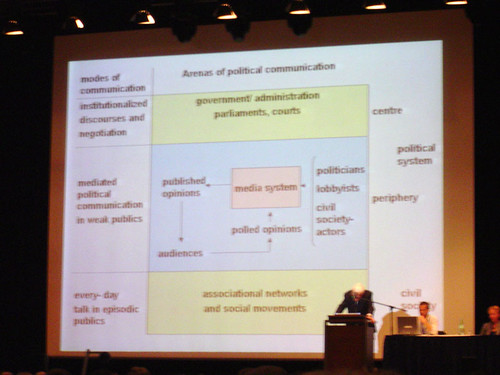 "Arenas of political communication" - slide in Jürgen Habermas's keynote at ICA 2006 in Dresden -- Courtesy of Snibe via Creative Commons license
"Arenas of political communication" - slide in Jürgen Habermas's keynote at ICA 2006 in Dresden -- Courtesy of Snibe via Creative Commons licenseWhat should be the role of the public and the press? Is democracy better served when journalists and experts communicate the information to the public or when the public can actively participate in the deliberative process? And how do the market mechanisms of the commercial newspaper industry impact these debates?
Karin Wahl-Jorgensen has tackled these questions through a solid network of critique, primarily using the theories of Habermas to compare and contrast various models. She provides a useful framework on the public sphere, while also bringing in legitimate critique from a range of disciplines. But of particular interest to me (the ever-curious cultural and media critic) were her takes on public journalism and exploration of liberal and deliberative democratic theory (particularly as it relates to the press).
Jorgenson glosses over a concept of of public journalism which is interesting, albeit rather abstract and academic. She provides no real background on what it is or any existing models. I'm not sure if she is talking about what is often referred to as “citizen journalism” (a problematic term in and of itself) of if this is another term for some branch of publicly funded media.
With regards to liberal vs. deliberative democratic theory, I found the debate surrounding rational vs. irrational debate fascinating. Though I value and uphold a belief in the necessity of a free (and funded) press to facilitate a democratic society, I think chasing after a distinction between rational and irrational is a red herring. True rationality is a myth, just like objectivity.
Finally, the format of deliberation is shifting away from a reliance on print and experts/gatekeepers. Some seem more willing to experiment with these new possibilities than others...

No comments:
Post a Comment